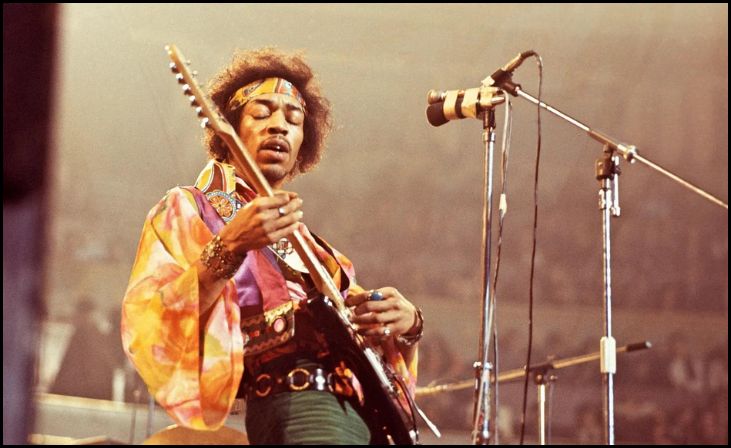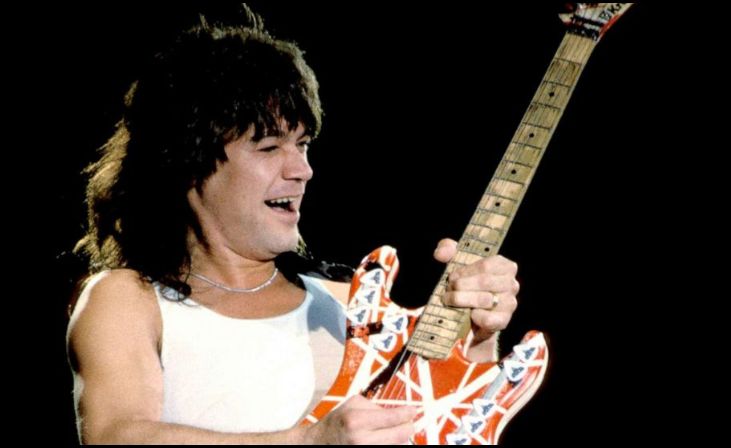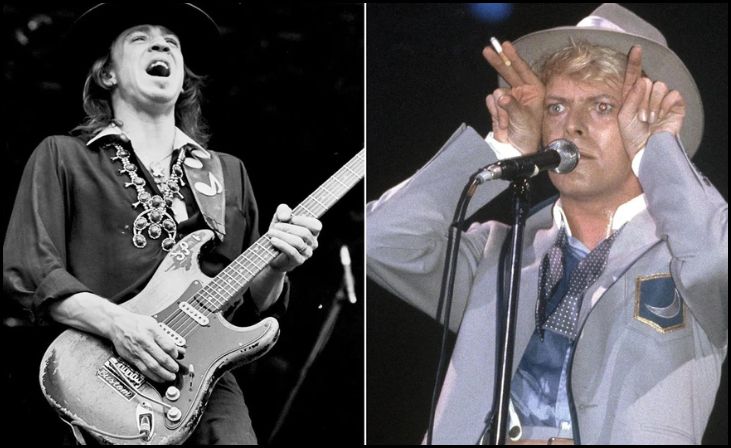Throughout history, certain guitarists have transcended mere musicianship, becoming icons who shaped entire genres. Their innovative techniques, soulful melodies, and electrifying performances continue to inspire generations. Dive into our list of the 10 most legendary guitarists and discover the magic they brought to the world, from blues pioneers to rock and roll royalty.
Jimi Hendrix: Voodoo Child of the Strat

Jimi Hendrix needs no introduction. In his brief but phenomenal career, he revolutionized the way the guitar was played, wielded it as an extension of himself, and conjured sounds never before imagined. Hendrix’s mastery of effects pedals like fuzz and wah-wah transformed the instrument into a wailing, expressive voice. His unorthodox playing style, using thumb fretting and feedback manipulation, defied convention and birthed iconic riffs like “Purple Haze” and “Hey Joe.” Hendrix’s stage presence was electric, a dazzling display of pyrotechnics and feedback-laden solos that burned themselves into rock and roll history. His influence on countless guitarists – from Eddie Van Halen to Lenny Kravitz – remains undeniable.
Jimmy Page: Architect of the Zeppelin Riff
Jimmy Page, the mastermind behind Led Zeppelin, was a riff-making machine. His riffs were monolithic slabs of sound, instantly recognizable and often serving as the foundation of Zeppelin’s anthems. From the bluesy swagger of “Whole Lotta Rosie” to the mystical journey of “Stairway to Heaven,” Page’s riffs propelled Led Zeppelin to superstardom. But Page wasn’t just a riff lord; he was also a gifted session musician with a vast musical vocabulary. He incorporated elements of folk, Eastern music, and classical into Zeppelin’s sound, creating a rich tapestry that transcended the boundaries of hard rock. His use of the studio as an instrument, evident in tracks like “Kashmir,” further cemented his reputation as a visionary guitarist.
Eric Clapton: Slowhand’s Enduring Blues Soul
Eric Clapton is a true chameleon, equally adept at fiery blues licks and soaring rock anthems. Nicknamed “Slowhand” for his smooth, fluid playing style, Clapton rose to fame with Cream, a pioneering supergroup that blurred the lines between blues and rock. Clapton’s soulful vocals and expressive solos were a key ingredient in Cream’s success, evident in classics like “Sunshine of Your Love.” His post-Cream career showcased his versatility, from the blues-rock explorations of Derek and the Dominos to the chart-topping ballad “Tears in Heaven.” Clapton’s unwavering dedication to the blues, his tasteful phrasing, and his enduring influence on guitarists across genres solidify his place among the legends.
B.B. King: The King of the Blues
B.B. King’s influence on the electric guitar, particularly in the blues genre, is immeasurable. His signature single-note bending technique, achieved with his vibrato-equipped Lucille guitar, became his calling card. King’s soulful vocals, imbued with both pain and resilience, perfectly complemented his guitar work, creating a sound that resonated deeply with listeners. Songs like “The Thrill is Gone” and “Every Day I Have the Blues” showcased King’s ability to weave tales of hardship and hope through his music. Beyond his technical mastery, King was a tireless advocate for blues music, carrying the torch for generations of guitarists who followed.
Chuck Berry: The Father of Rock & Roll
Chuck Berry’s infectious energy and pioneering guitar work laid the foundation for rock and roll. His rhythmic strumming style, heavily influenced by jazz and blues, laid the groundwork for countless rock guitarists. Berry’s lyrics, often playful and humorous, celebrated teenage life, cars, and the thrill of rebellion, perfectly capturing the spirit of the emerging rock and roll generation. Songs like “Johnny B. Goode,” “Maybellene,” and “Roll Over Beethoven” became anthems, influencing artists like The Beatles, The Rolling Stones, and countless others. Chuck Berry’s music transcended racial barriers and cultural divides, uniting audiences under the power of rock and roll.
Eddie Van Halen: A Technical Titan

Eddie Van Halen wasn’t just a guitarist; he was an innovator who redefined the instrument’s potential. His revolutionary two-handed tapping technique, where both hands hammer out melodies on the fretboard, left audiences awestruck. Van Halen’s mastery of effects pedals, particularly his use of distortion and harmonics, created a sonic landscape that pushed the boundaries of rock guitar. Tracks like “Eruption” and “Hot for Teacher” became showcases for his technical prowess, inspiring generations of shredders. Beyond his technical wizardry, Van Halen possessed a unique sense of melody, evident in iconic riffs like “Jump” and “Panama.” His inventiveness extended to building his own signature guitar, the “Frankenstrat,” a testament to his desire to push the boundaries of sound. Eddie Van Halen’s impact on rock music is undeniable, leaving a legacy of technical mastery, boundless creativity, and a sound that continues to inspire.
Slash: Top Hatted Hero of Hard Rock
Slash, the enigmatic guitarist behind Guns N’ Roses, carved a niche with his blues-soaked, riff-heavy style. His use of Les Paul guitars and wah-wah pedals created a signature sound that was both raw and melodic. Slash’s riffs were the backbone of Guns N’ Roses’ success, driving anthems like “Sweet Child o’ Mine” and “Welcome to the Jungle.” His improvisational skills were legendary, weaving intricate solos that perfectly complemented Axl Rose’s vocals. Beyond Guns N’ Roses, Slash has collaborated with numerous artists, showcasing his versatility and adaptability. His top hat and sunglasses became as iconic as his playing, solidifying his image as a rock and roll gunslinger. Slash’s enduring appeal lies in his ability to blend blues feeling with hard rock swagger, creating a sound that continues to resonate with fans worldwide.
Angus Young: AC/DC’s Electrifying Powerhouse
Angus Young, the lead guitarist and sole constant member of AC/DC, is a force of nature on stage. His stripped-down, blues-based approach focuses on raw power and electrifying riffs. Angus’ reliance on simple, yet effective pentatonic scales creates a sound that’s instantly recognizable and guaranteed to get heads banging. Songs like “Back in Black,” “Highway to Hell,” and “Thunderstruck” are testaments to his ability to craft instantly memorable riffs that are as catchy as they are powerful. His stage presence is equally electrifying, a whirlwind of energy in his schoolboy uniform, captivating audiences with his commitment to the music. Angus Young’s dedication to pure, unadulterated rock and roll, along with his ability to craft timeless riffs, secures his place as a legendary guitarist.
Keith Richards: The Rolling Stones’ Riffslinger
Keith Richards, the co-founder and guitarist of The Rolling Stones, is a master of crafting deceptively simple yet undeniably infectious riffs. His open-tuned guitars and rhythmic strumming style became a cornerstone of the Stones’ sound, driving classics like “Brown Sugar,” “Satisfaction,” and “Start Me Up.” Richards’ playing often weaves in and out of melody and rhythm, creating a signature groove that’s both loose and undeniably tight. Beyond riffs, Richards possesses a keen sense of song structure and songwriting, often co-writing with Mick Jagger to create timeless rock anthems. His influence on countless guitarists is undeniable, with his raw and bluesy approach inspiring generations of rock and roll musicians. Keith Richards’ legacy lies in his ability to create iconic riffs that form the backbone of The Rolling Stones’ music, ensuring his place as a true guitar legend.
Stevie Ray Vaughan: Texas Tone Terror

Stevie Ray Vaughan emerged in the 1980s, breathing new life into the blues with his scorching fretwork and unmatched passion. Vaughan’s fiery playing style, influenced by Texas blues legends like Albert King and Freddie King, was characterized by blistering bends, double-stops, and a deep understanding of blues phrasing. His mastery of the Stratocaster, often played through cranked Fender amps, produced a distinctive tone that was both fat and articulate. Tracks like “Pride and Joy” and “Couldn’t Stand the Weather” showcased his ability to weave intricate solos around soulful vocals, creating a sound that resonated with blues purists and rock fans alike. Vaughan’s tragically short career left an undeniable mark on the guitar world. His dedication to the blues, technical mastery, and ability to deliver raw emotion through his music solidified him as a true legend.
Conclusion
This list merely scratches the surface of the incredible talent that exists in the guitar world. Each legend we explored offered a unique voice, pushing the boundaries of the instrument and leaving an undeniable mark. Who is your favorite guitar hero? Share your picks in the comments and keep the conversation about these shredding greats alive!




